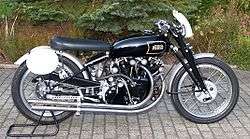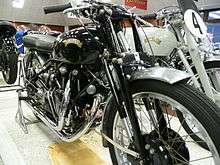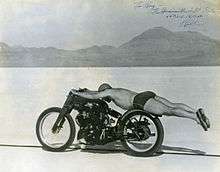Vincent Black Lightning
 | |
| Manufacturer | Vincent HRD |
|---|---|
| Production | 1948–1952 |
| Engine | 998 cc (60.9 cu in) V-twin, pushrod OHV, air-cooled |
| Compression ratio | 6.8:1 to 12.5:1 |
| Power | 70 bhp (52 kW) |
| Wheelbase | 55.5 in (1,410 mm) |
| Fuel capacity | 3.75 imperial gallons (17.0 l) |
| Related | Vincent Black Shadow |
The Black Lightning was a Vincent-HRD motorcycle first built in September 1948 at the Vincent works in Great North Road, Stevenage, Hertfordshire, UK, and produced from 1948 to 1952. At the time the Black Lightning was the fastest production motorcycle in the world.[1]
Development
Vincent-HRD began motorcycle production in 1928 and were well established after World War II when they launched the 1,000 cc (61 cu in) Black Lightning. This was a production version of the Black Lightning which held the motorcycle land-speed record, with a similar engine specification.[2]

Available to order, a standard Black Lightning was supplied in racing trim with magnesium alloy components, special racing tyres on alloy rims, rear-set foot controls, a solo seat and aluminium mudguards. This reduced the Lightning's weight to 380 lb (170 kg). The 998 cc (60.9 cu in) air-cooled OHV pushrod V-twin specifications were always based on standard parts but upgraded with higher performance racing equipment. The Black Lightning had higher strength connecting rods, larger inlet ports, polished rocker gear, steel idler gears, racing carburettors, a manual-advance magneto and was available with compression ratios between 6.8:1 and 12.5:1.[3] This resulted in 70 bhp (52 kW) and a top speed of 150 mph (240 km/h). Only 31 Black Lightnings were ever built before production ended in 1952 because of Vincent's financial problems.[1]
US record and picture

On 13 September 1948, Rollie Free achieved the US national motorcycle speed record at Bonneville Salt Flats in Utah riding the first Vincent Black Lightning. During test runs Free reached average speeds of 148.6 mph (239.1 km/h). To reduce drag, Free stripped to his swimming shorts for the final run, which he made lying flat with his legs stretched out and his head low, guiding the Vincent by following a black stripe painted on the salt bed. The stunt worked as Free covered the mile in 23.9 seconds, passing the 150 mph (240 km/h) barrier and on the return run he reached a record average speed of 150.313 mph (241.905 km/h).[4][5] This led to one of the most famous photographs in motorcycle history, known as the "bathing suit bike". The American Motorcyclist Association certified Free's record. Innovative features of the bike included the first-ever Vincent rear shock absorber, the first Mk II racing cams and horizontally mounted racing carburettors.[1] In 1950, Rollie Free returned to the Bonneville Salt Flats and broke his own record, averaging speeds of 156.58 mph (251.99 km/h) on the Vincent despite a high-speed crash during those speed trials.[4]
Supercharged Black Lightning
In 1949 The Motor Cycle magazine offered a trophy and £500 prize (£20 thousand today)[6] for the first successful all-British attempt on the World Speed Record, held since 1937 by BMW at 173.54 mph (279.29 km/h). Reg Dearden, a motorcycle dealer at Chorlton-cum-Hardy in Manchester fitted a supercharger to a brand new Black Lightning and made extensive modifications including strengthening and lengthening the frame by about 6 inches (15 cm). Phil Vincent personally supervised the work, which took months to complete. NSU increased the World Record to 180.29 mph (290.15 km/h) in 1951, and in 1953 the 500 cc World Champion Les Graham was to make an attempt for the UK but was killed in a crash in the 1953 Senior Isle of Man TT. The supercharged Vincent changed hands several times but never made a record attempt. In 1999 journalist Mick Duckworth had a test ride and wrote a feature article for Classic Bike magazine.[2] In October 2008, the 'Dearden' supercharged Vincent Black Lightning was sold by Bonhams for £221,500 at the Stafford Motorcycle Show, setting a record as the most expensive motorcycle sold at auction in the UK to that date.[7][8][9] There is a supercharged 1949 Black Lightning at the Solvang Vintage Motorcycle Museum in Solvang, California.[10]
Cultural allusions
Richard Thompson wrote the song "1952 Vincent Black Lightning" and recorded it for his 1991 album Rumor and Sigh.[11] Thompson later said, 'When I was a kid, that was always the exotic bike ... the one that made you go "ooh, wow"'.[12] The song's outlaw hero James, who has “robbed many a man to get my Vincent machine,” comments on the bike's mystique in his dying speech:
Says James, in my opinion, there's nothing in this world
Beats a '52 Vincent and a red headed girl.
Now Nortons and Indians and Greeveses won't do
They don't have a soul like a Vincent '52.[13]
See also
- Vincent Black Shadow
- Vincent Rapide
- List of motorcycles of the 1940s
- List of motorcycles of the 1950s
Notes
- 1 2 3 "The Fastest Production Bike In The World!". Archived from the original on February 6, 2009. Retrieved 2009-02-07.
- 1 2 "The Dearden Supercharged Vincent Black Lightning". Retrieved 2009-02-07.
- ↑ "Vincent Motorcycles". Retrieved 2009-02-07.
- 1 2 "Rollie Free". Retrieved 2012-02-24.
- ↑ Tooth, Phillip. "Rollie Free and the Bathing Suit Bike". Motorcycle Classics, November/December 2010. Accessed: 19 May 2013.
- ↑ UK CPI inflation numbers based on data available from Gregory Clark (2016), "The Annual RPI and Average Earnings for Britain, 1209 to Present (New Series)" MeasuringWorth.
- ↑ Carnell, Sarah. "Vincent Black Lightning sells for record price". Retrieved 2009-02-07.
- ↑ Backus, Richard (30 October 2008), "Supercharged Vincent brings record price but misses pre-sale estimates", Motorcycle Classics, retrieved 2011-03-27
- ↑ Sale 16253 - Collectors’ Motorcycles and Related Memorabilia, Bonhams, 19 October 2008, retrieved 2011-03-27
- ↑ 1949 Vincent Black Lightning - Supercharged, Solvang Vintage Motorcycle Museum
- ↑ Gross, Ken (2009-09-15). "Leno's Black Shadow". In Tom Cotter. The Vincent in the Barn: Great Stories of Motorcycle Archaeology. MotorBooks International. p. 253. ISBN 9781616730277. Retrieved 28 March 2014.
- ↑ "Richard Thompson: Solitary Life" at bbc.co.uk
- ↑